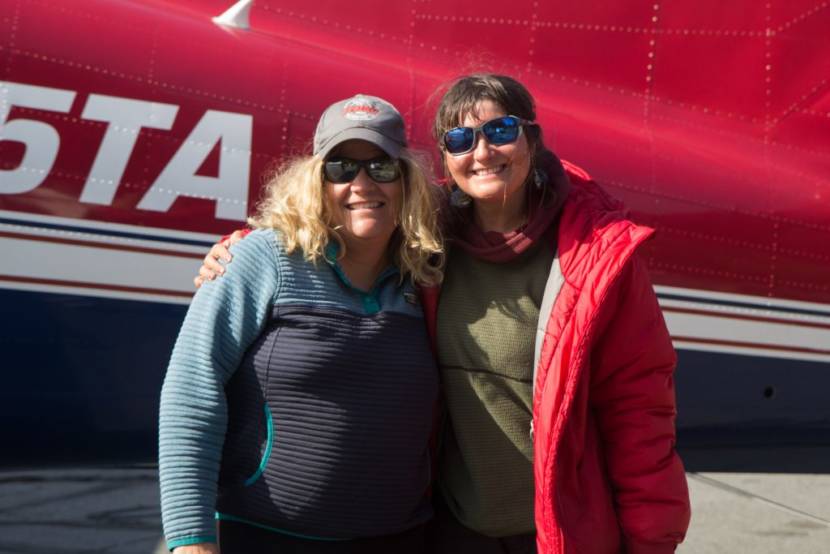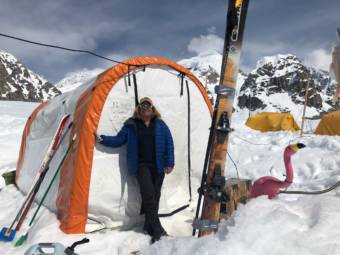
The Kahiltna base camp was disassembled last week, signaling the end of the 2021 climbing season on Denali.
Kahiltna is the name after the glacier where climbers begin and end their journey. Teams are flown to the glacier by one of the local Talkeetna air services before climbers get checked into base camp by someone who, for three months, works and lives on the glacier.
This year, longtime base camp manager Lisa Roderick alternated managing the camp with new assistant Gabby Faurot. Faurot grew up around Denali, climbing and camping in the Alaska Range with her father, Chip.

During the height of climbing season, base camp managers might have 100 climbers at a time who are anxious to fly back to Talkeetna for a shower and a hot meal. During those weeks, keeping an orderly cue for flights out of the range is an important task for the base camp manager.
“I kind of struggle with being assertive and this is a job that you have to be assertive,” Faurot said. “People came up and they’re in my face about wanting to leave, and I had to just lay it on the line. Like, ‘Hey, you can’t get out right now. No one’s going to fly in to pick you up because the weather’s bad.’”
She said she learned some tricks for curing climbers’ frustrations.
[Sign up for Alaska Public Media’s daily newsletter to get our top stories delivered to your inbox.]
“One time I played frisbee with some people and that got them a little loosened up, they were a little bit happier, but the lemonade really does the trick. Just give them a glass of lemonade, sit down, ask them how their trip went,” she said.
Base camp is funded through the Air Association of Talkeetna. K2 Aviation and Talkeetna Air Taxi each collect a small fee from the clients they fly in to climb Denali. The air taxis then send that money to the Air Association, which pays the expenses for base camp.
Faurot described some of the tasks she performs on the glacier.
“I talk to the pilots, let them know what the weather is looking like, talk to the climbers, introduce them to base camp, gave them their gas, got them on their planes when they came back,” she said. “You have a record of all the people, their permit number, their team name, how much fuel they paid for, what kind of communication they have and their routes — and then their projected out date so we can kind of keep tabs on that.”
One of the most important aspects of the job is communicating the weather to the air taxis so they can fly climbers in and out of the range. Faurot found she developed some pretty good forecasting skills.
RELATED: Park Service rangers describe troubling conduct as hundreds of climbers attempt Denali
“It’s all about patterns out there,” she said. “Especially with the fog, you would notice when the breaks would come in and when it would start to clear, and then I was able to pay more attention to the wind patterns, and if I felt a certain type of wind, I would know that hey, maybe it’s going to clear out in like fifteen minutes.”
As with any new job, sometimes it’s difficult to know what’s most essential. And it’s crucial to have a good support system when you find you don’t have what you need.
“I need so much Chapstick,” Faurot said. “My lips get really dry out there. It’s so sunny. I had to have a plane fly a tube in at one point cause my lips started to split the first week, or the first two weeks I was out there. And the gals over at Spinach Bread would send me a burrito every once in a while and that was really, really nice.”
By early July, the snow on Denali softens and makes travel difficult for mountaineers. Climbers typically aim to finish their expeditions before that happens. Faurot explains what drives the decision to pack up base camp for the season.
“It’s the deterioration of the glacier. Crevasses are starting to open up a lot more than they were in the beginning of the season. It’s not freezing as much overnight. That is not super conducive to safe glacier travel, because snow on top of crevasses is really soft so you don’t have strong enough ice bridges,” she said.
Right now, there aren’t many climbers left on the mountain. Since the teams carry inReach devices, the remaining climbers will be able to text air services directly and may well be the lone clients on the Kahiltna Glacier awaiting pick-up when their plane arrives.
Faurot looks forward to returning next year. Despite the remoteness of her job, she came away with a deep reverence for the Alaska Range.
“There’s this poem, it’s about appreciating the mountainside versus the summit,” she said. “It’s not all about go, go, go, get to the top, that’s the only thing that matters. It’s about looking down at the ground, what you’re walking on, what you’re walking past, and you appreciate everything that it takes to get to the summit.”
And you can be sure some of that appreciation is held for people like Faurot, working from her office on the Kahiltna Glacier.
"much" - Google News
July 15, 2021 at 11:06PM
https://ift.tt/2TdBykl
'So much Chapstick': Denali base camp worker reflects on her first year on the glacier - Alaska Public Media News
"much" - Google News
https://ift.tt/37eLLij
Shoes Man Tutorial
Pos News Update
Meme Update
Korean Entertainment News
Japan News Update
Bagikan Berita Ini














0 Response to "'So much Chapstick': Denali base camp worker reflects on her first year on the glacier - Alaska Public Media News"
Post a Comment